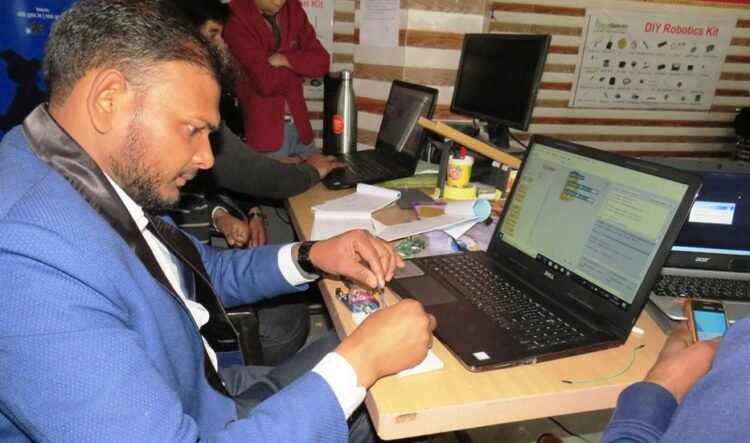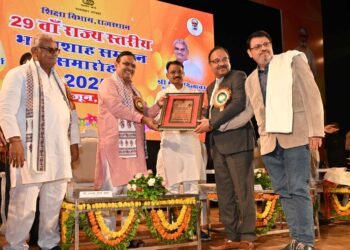Capgemini India in partnership with NITI Aayog and SRF Foundation have teamed up for the development of Atal Community Innovation Center (ACIC) to promote entrepreneurship and innovation.
The objective of this initiative is to serve as a platform for promotion of world-class innovation hubs, grand challenges, start-up businesses and other self-employment activities, particularly assist with sustainable and profitable business models in the field of technology. Capgemini’s vision of digital inclusion led to this partnership in promotion of future skills in the country.
As a partner, Capgemini India has committed its role in providing financial support with a strong backup of resources from their leadership team as mentors. The organization would also be connecting experts from the field to help the participants engaged with the program. Further, through the signing of the intent, mutual thoughts have been shared to develop programs to establish new Atal Tinkering Labs (ATL).
A country as huge as India is brimming with new, innovative ideas and dreams. There are talks of starting a business of one’s own at every gathering. Talk to any random person on the street, and they will have had at least one business idea in their lifetime. However, a majority of these ideas never come to fruition.
The Atal Innovation Community Center program under the Atal Innovation Mission aims to build a robust and inclusive Innovation ecosystem in the unserved/underserved regions of India. The focus areas for Atal Innovation Community Centers are – Tier II, Tier III and underserved areas of Tier I cities, North-East, Jammu and Kashmir, Smart Cities, Aspirational Districts, Rural and Tribal Areas.
The reason for the lack of implementation of these ideas is that most people never get the chance. They either don’t have the funds, are not aware of the competition in the industry, or are not able to figure out the logistics of the operation. Put simply, they do not have anyone to support and guide them.
According to the Department for Promotion of Industry and Internal Trade under the Ministry of Commerce, India is the 3rd largest startup ecosystem in the world, with 2-3 startups being born every day. This is when only a select few people are able to procure everything they need to start an enterprise of their own. One can only imagine the heights the country could soar to if every idea, every dream, was given the required resources to come to life.
Currently among 19 shortlisted ACICs, nine have been made operational across eight states namely Haryana, Punjab, Jharkhand, Tamil Nadu, Andhra Pradesh, Rajasthan, Telangana and Uttar Pradesh where some of the labs have been completely setup while others are still in process. Under the program, various activities are designed to be executed to help the individuals. One of the key values with which an ACIC operates is social consciousness, which translates into awareness and knowledge about the society and its components. Only when an ACIC function with a deep understanding of the society and its people, will it be able to address and solve the corresponding challenges and in fact, welcome within its space innovators from all backgrounds. In a bid to imbibe this inclusivity in an ACIC, the core team members will undergo sensitization and awareness trainings for understanding and acknowledging the gender spectrum, caste divide and disabilities. The trainees will also learn about various interventions to make ACICs more inclusive for all members of the community.
On the same principles, with the motive to imbibe the values of inclusivity and equality within the fellows, they will also undergo sessions for sensitization and awareness. This change in perspective will also translate in the innovations and solutions that they come up with. In coordination with the ACICs, document stories of successful grassroot innovators in the region of ACICs in the form of videos, articles or podcasts which will then be hosted on the Digital Learning Platform and the social media. The objective is to make popular stories and use them to inspire other budding innovators.
Eventually, extension of such documentation of a few selected fellows will be collected and SRF Foundation would look at releasing a book of such case studies. Further, in order for the Atal Innovation Mission team to keep track of activities and outcomes for each of the ACICs and AICs, a digital Monitoring and Evaluation Portal (M&E) is required. Although ACICs and AIC are 2 separate programs under AIM, the data points that need to be reported are similar. Hence, one portal needs to be built (from data capturing to visualisation) with slight differences in data points that need to be captured in each of the AIC and ACIC programs. To help up-skill, Functional and Digital Literacy sessions are conducted where fellows are taught to be proficient in English, technology basics like Microsoft office, email, google tools, advanced technology like digital marketing, social media marketing, graphics, software for team management etc are also been taught.
They are also provided lessons in finance as well. Based on the area of interest of Capgemini, they can adopt 30 fellows from the ACICs and support them financially as well as guide their journey till the end providing specific coaching and consultation.
To support the ecosystem of ACIC there are collaborations and organisational support for pitch events at regional and national level for ACICs. There is identification of various senior/mid-level industrial and technical experts and are then aligned to the mentor pool for ACICs. And finally, seminars and workshops on social, technical and business-related topics are conducted Overall, the Centres are holistically promoting innovation in the country and helping inventive minds to get the resources they need to be successful
In India, entrepreneurship is generally discouraged, and instead, white collar jobs are preferred. Possibility of failure deters people from fulfilling their dreams. However, programs like the Atal Community Innovation Center provide the disenfranchised with the means to realize their ideas into sustainable products that have utility and will solve problems that people face in day-to-day life.



















